Jimmy Carter

Since his death, Carter’s remarkable life and numerous accomplishments have been rightly celebrated, including the Camp David Accords, a historic nuclear weapons treaty, major environmental protection legislation, the release of political prisoners, the near-eradication of the Guinea worm, aid in conducting free and fair elections in dozens of countries around the world, and decades of volunteer service with Habitat for Humanity. But despite this impressive legacy, what most inspires me about Carter was how he applied his faith to the messiness of politics, both during his time in the White House and in his many years after — a model that we desperately need today in our increasingly polarized and vitriolic politics.
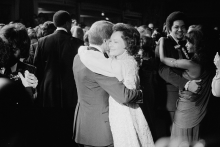
Former first lady Rosalynn Carter, who President Jimmy Carter called “an extension of myself” owing to his wife’s prominent role in his administration even as she tirelessly promoted the cause of mental health, died on Sunday at age 96, the Carter Center said.

Because of evangelical political behavior over the last several decades, it’s tempting to believe that evangelicals have always supported right-wing causes and politicians. That is not the case, and there’s some reason to believe that in the run-up to the 2020 presidential election, we may be witnessing an awakening of conscience among some evangelicals. If so, progressive evangelicals could do far worse than look to the 1970s for inspiration.

Nearly 40 years ago, on July 15, 1979, President Jimmy Carter went on national television to share with millions of Americans his diagnosis of a nation in crisis. “All the legislation in the world,” he proclaimed, “can’t fix what’s wrong with America.” He went on to call upon American citizens to reflect on the meaning and purpose of their lives together.
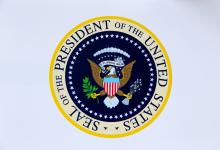
WITH ONLY a month left before the start of the annual war on Christmas—my Bill O’Reilly desk calendar keeps me up to date on all the seasonal liberal conspiracies—there is still time to plan this year’s shopping, starting with a new president.
Despite the fact that most voters are in critical need of a discerning hand to guide their choice—a choice that requires more thought than is possible during the commercial breaks on “Dancing With the Stars”—Sojourners is forbidden from providing that guidance because of restrictions from the Internal Revenue Service.
But this election is too important for us to quietly surrender to 501(c)(3) rules, since acquiescence is the final sanctuary of the coward, if he knew how to spell it. This year, with our nation so divided, it is time for Sojourners to issue a clear endorsement of one candidate, regardless of the consequences (a word that uses the letter “c” with laudable efficiency).
WE HAVE committed acts of civil disobedience before—getting arrested for protests against South African apartheid, the secret wars in Central America, and the immoral budget priorities of Congress, and, in a lesser known act of conscience, loudly objecting to the watered-down beverages on tap at our neighborhood bar. (Always the clever one in the group, I called it “tap water.”) The pizza was also horrible, but we let that one slide. The arc of the moral universe is long, but it bends toward justice. Unfortunately, justice is probably going to get bent long before they add more pepperoni. You just can’t rush bad pizza.
But where was I? Oh yes, our brazen act of defiance against restrictions of our 501(c)(3) status. It should be noted that 501(c)(4) nonprofits are allowed more leeway, as long as their work is educational and contributes to the “social welfare” of the country. The fact that many 501(c)(4)s are mainly promoting the social welfare of industrial polluters, gun manufacturers, and other groups of interest to Karl Rove is beside the point.

I just met with the three children of Martin Luther King Jr. on a number of occasions over a two-year period and eventually they decided themselves to resolve their differences, which had existed only in court with lawsuits against each other.
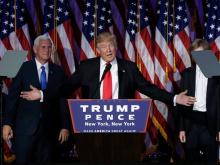
If President Obama’s appearance at the Notre Dame commencement in 2009 sparked an unprecedented uproar among American Catholics, imagine what inviting President Trump to graduation might provoke.
That concern is making Notre Dame’s president, the Rev. John Jenkins, think twice about making a pitch for the incoming U.S. president to receive an honorary degree, an appearance that almost any school would normally covet — and one that the iconic Catholic university has been more successful than others in securing.

Pastors Frederick Haynes and George Mason both lead Baptist churches in Dallas, but they had never met until the not-guilty verdict in the death of Florida teen Trayvon Martin brought them together in 2013.
Now the two men — one the leader of a predominantly black megachurch, the other of a mostly white congregation — have signed a “covenant of action” spearheaded by former President Jimmy Carter.
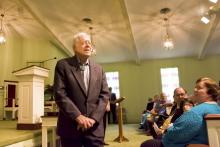
Former president Jimmy Carter was late to his Bible study class Sunday morning, something he said never happens as he walked up to the front of the sanctuary. There he received hugs from those who likely already knew why.
His service started with an announcement of something Carter’s voice indicated was weighing heavily on his heart.
His grandson, Jeremy Carter, who had spent Thanksgiving with him just weeks ago, died suddenly in the night.

“I believe Jesus would. I don’t have any verse in scripture. … I believe Jesus would approve gay marriage, but that’s just my own personal belief. I think Jesus would encourage any love affair if it was honest and sincere and was not damaging to anyone else, and I don’t see that gay marriage damages anyone else…” —Jimmy Carter, from his interview with Huffington Post Live
I grew up in Texas as a churchgoing Baptist. I memorized Bible verses as part of my “sword drills,” went to church camp, took part in the clown ministry and even helped in the nursery.
Then I was kicked out at age seventeen for asking too many questions. My youth minister actually threw a Bible at my head and, in a less than nuanced way, invited me to move on, lest I contaminate the minds and hearts of my friends with my doubt.
Some of my questions had to do with their biblical interpretation, which was literal — and their assertion that the texts we were memorizing were the perfect, infallible Word of God, straight from the mind of the Divine to the paper on which it was written.
I had questions.
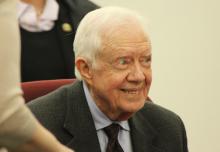
Former President Jimmy Carter said in an interview that he thinks Jesus would approve of gay marriage.
“I think Jesus would encourage any love affair if it was honest and sincere and was not damaging to anyone else, and I don’t see that gay marriage damages anyone else,” Carter said in a HuffPost Live interview with Marc Lamont Hill published July 7.
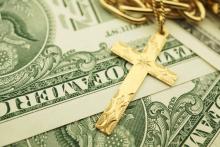
RELIGION AND electoral politics tend to be mutually debasing. Take the apparent exception, Jimmy Carter. His politics were informed by his theological insights: a regard for the poor and despised (he was the first U.S. president to take the Third World seriously); a sense of human limit (he did not take it for granted that Americans have a right to consume a disproportionate share of the world’s goods); and a recognition of the humanity of others, even of enemies (the Soviet Union was not the Evil Empire for him).


RECENT POLLS SUGGEST that America’s vaunted religiosity is slipping, including the percentage of people willing to identify themselves as evangelicals. At the same time, the percentage of avowed secularists has risen. A movement calling itself the “New Atheism”—those adamantly opposed to religion—has attracted a considerable following.
The oracles of this movement—including Richard Dawkins, Sam Harris, Daniel Dennett, and the late Christopher Hitchens—deny any possibility of the supernatural, assert that religious belief is irrational, and posit that religion has caused untold evil and suffering throughout history. Because of their dogmatism and their refusal to countenance views other than their own, I refer to these people as “secular fundamentalists.”
Hard data may be elusive, but the latest generation of American young people is much less religious than the last, and the growing secularism they represent could be a byproduct of the polarizing effect of the Religious Right. With evangelical fundamentalism being the dominant and most public form of U.S. Christianity over the last generation, young seekers would rather turn away from all religion than adapt to the harsh expression of faith that excludes so many of their peers and often stands against their aspirations for fairness and equality.
Religious fundamentalism has tainted the reputation of Christianity. For many, unbelief has become more palatable than belief, if believing requires an embrace of the distortions that have so characterized U.S. Christianity over the last several decades.
What prompted the emergence of this New Atheism or secular fundamentalism? What historical forces contributed to its rise? The roots of this phenomenon go back more than three decades—to the political mobilization of a different species of fundamentalism that became the movement commonly known as the Religious Right.

Twelve years ago we took our beloved Maltese dog, Moose, to the vet and came home without him. Moose was in the late stages of congestive heart failure, and many times each day he was wheezing and crying out in pain. While my daughter held the little dog, the vet gave him a shot. It was over very quickly.
Why don't we treat death row prisoners at least as well as we treat dogs?
"Secret Drugs, Agonizing Deaths" is the headline on an article in yesterday's New York Times. Back when executioners wielded axes, they tended to wear hoods so people wouldn't recognize them. Nowadays states still conceal executioners' identities — and much more.
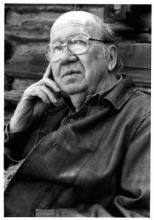
The Rev. Will D. Campbell, a Baptist minister and early white civil rights activist, as well as best-selling writer and folksy raconteur, died Monday in Nashville, Tenn. He was 88.
With a fiercely independent streak and sometimes prickly personality, Campbell used his powerful way with words to explore American racism, especially the contradiction inherent in Christian support for segregation across the South.
And he had his own contradictions, as well. A Southern Baptist who drank moonshine with the Catholic nuns he counted as his friends, Campbell was an equal-opportunity critic, castigating liberals as well as conservatives in his writing and preaching and storytelling.

Jimmy Carter offered an open letter a few years ago explaining why he divorced himself from the Southern Baptist Convention after six decades as a deacon and Sunday School teacher. Basically, he contended that the SBC continued to legislate gender inequity from the top-down, cherry picking select verses to serve a desired patriarchal end, to which Carter responds:
It was, however, an unavoidable decision when the convention’s leaders, quoting a few carefully selected Bible verses and claiming that Eve was created second to Adam and was responsible for original sin, ordained that women must be “subservient” to their husbands and prohibited from serving as deacons, pastors or chaplains in the military service.
It’s easy, in the daily course of events, to forget how pervasive such judgments against the equality of women really are, especially as we have examples of powerful women in political office and business. But just as having a black President doesn’t solve racial inequities, neither do a handful of high-profile women indicate there isn’t an ongoing struggle for parity among millions of other women without such power.

Jimmy Carter is the 39th president of the United States, founder of the Carter Center and recipient of the Nobel Peace Prize. He has authored many books, the most recent being "Through the Year with Jimmy Carter: 366 Daily Meditations from the 39th President." In the wide-ranging interview that follows on the blog, the Huffington Post's Senior Religion Editor Paul Raushenbush spoke to President Carter by phone about the role faith played in the Israel-Egypt Peace Treaty, the time of his greatest alienation from God, faith in the White House and his personal daily devotional practice. This post originally appeared on HuffPo.

Huffington Post: An Interview with United States 39th President Jimmy Carter, Religion News Service: Romney’s Evangelical Problem Starts with Theology, Huffington Post: On Scripture: Mark 1:4-11: Does Baptism Make for Better Presidents?, Huffington Post: Obama Fails on Minimum Wage Pledge, Slate: NAACP Condemns Rick Santorum’s “Black People” Gaffe, TPM: Defense Secretary Panetta: Defense Cuts Come With ‘Additional But Acceptable Risk’, CNN: Controversial Catholic program for gays begins in Connecticut, CNN: What happens when candidates called by God drop out?